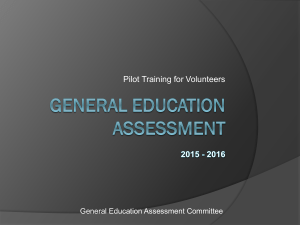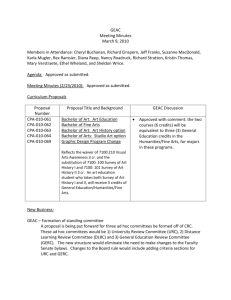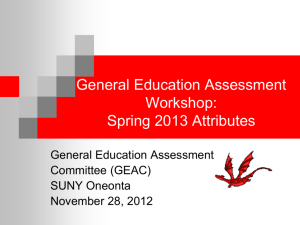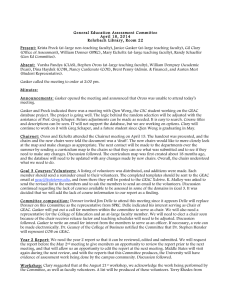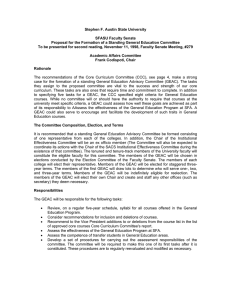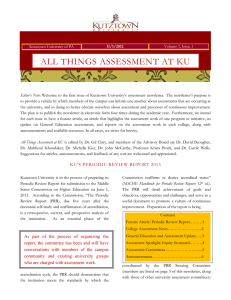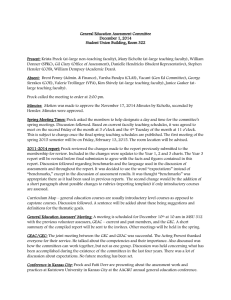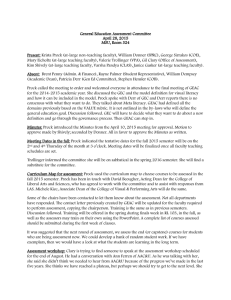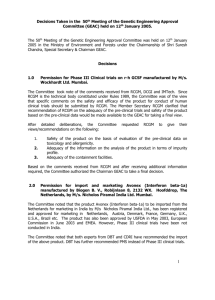GENERAL EDUCATION ASSESSMENT COMMITTEE (GEAC) GENERAL EDUCATION ASSESSMENT CUMULATIVE REPORT 2011-2014
advertisement
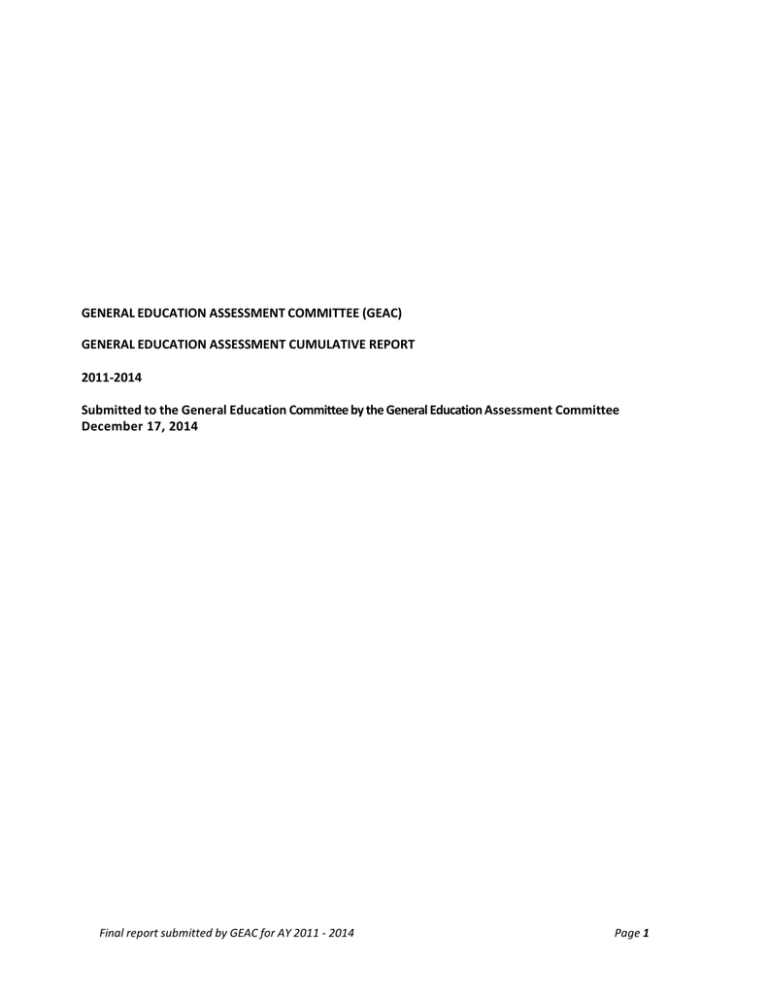
GENERAL EDUCATION ASSESSMENT COMMITTEE (GEAC) GENERAL EDUCATION ASSESSMENT CUMULATIVE REPORT 2011-2014 Submitted to the General Education Committee by the General Education Assessment Committee December 17, 2014 Final report submitted by GEAC for AY 2011 - 2014 Page 1 General Education Assessment Committee College of Business College of Education College of Liberal Arts & Sciences College of Visual & Performing Arts At-large Teaching Faculty At-large Teaching Faculty At-Large Teaching Faculty At-Large Non-Teaching Faculty Strategic Planning and Resources Committee Division of Administration and Finance Academic Dean Office of Assessment Student Government Board General Education Committee Clerical Support Final report submitted by GEAC for AY 2011 - 2014 Stephen Hensler Georgeos Sirrakos Varsha Pandya, Secretary Valerie Trollinger Janice Gasker Mary Eicholtz, Vice-Chair Kim Shively Krista Prock, Chair William Donner Brent Penny William Dempsey Gil Clary Danielle Hendricks Randy Schaeffer Kathi Malloy Page 2 This is the first cumulative report on the assessment of general education provided by the Kutztown University General Education Assessment Committee (GEAC.) As such, the report will contain much more than just the data collected during 2011-2014. This report outlines the development of the assessment process GEAC has been using and refining. Results are presented but should not be used to draw any conclusions about the abilities of KU students. In outlining this process, GEAC identifies some minor concerns related to the general education goals and domains. Several suggestions related to the goals and to the assessment process follow the three year summary. Goal 1: Intellectual and Practical Skills Year 1 The general education Assessment Committee members discussed and exchanged ideas about how to begin and plan for assessment of a new general education (GE) program whose implementation began with the new academic year in 2011. In early conversations, GEAC members acknowledged that there were three goals of the general education program, and therefore a three-year assessment cycle with a year devoted to each goal was most logical. At the same time, GEAC’s thoughts were rooted in the structured components of general education program, due to the use of check-sheets to track students’ completion of general education requirements. For these reasons, and due to time constraints (one semester in which to collect data) in year one GEAC planned and executed the assessment of core courses required of every student at Kutztown University (ENG 023, COM 010, HPD 101, and 2 MAT courses.) The new general education program also has five competencies across the curriculum, and members debated their role in assessment without emergence of any concrete method of assessing them. The first task completed by GEAC was development of data reporting templates for each domain of the three goals. These were adapted from the VALUE rubrics developed by the Association of American Colleges & Universities (AAC&U). Though the AAC&U rubrics assess students’ achievement of Gen Ed goals from introductory courses to capstone courses, the committee decided to move away from that model because its predominant thinking was that Gen Ed goals should be achieved in first two years of college experience, preferably before advancing within their major. Since four core curricular areas of English composition, Oral communication, Mathematics, and Wellness were selected as part of assessment of goal one, the data was collected by departments offering these courses and submitted to GEAC. Simultaneously, college assessment committees were expressing concerns of the faculty members that routing the data through department chairs may affect their tenure and promotion evaluations. GEAC identified training needs in these areas: transferring data on reporting templates from course-based assessments; separating assessment of student achievement of general education goals from instructor performance evaluations; and different perspectives and methods on assessment. It also identified a need to train GEAC members in general education assessment and several members attended two AAC&U summer institutes on general education and assessment. Final report submitted by GEAC for AY 2011 - 2014 Page 3 English composition and oral communication courses assessed the “written and oral communication” domain and wellness course assessed “wellness” domain. However, the mathematics course did not directly address any domain of goal 1. The chair of the general education committee, who also served on GEAC, and was from Department of Mathematics guided the assessment effort of Mathematics core courses for “decision-making” and “quantitative literacy” domains. Thus only four of the seven domains were assessed during first year of cycle one. GEAC reflected on the process at the end of the first year and decided to adopt goal and domain-based assessment for the remaining two-year of the cycle and in future assessment cycles. The idea of establishing expectations of student performance was also floated. Year One Results Domain # Domain Name PL – 4 PL – 3 PL – 2 PL – 1 PL - 0 1.2 Decision making n = 202 Written Communication n = 92 Oral Communication n = 667 Quantitative Literacy n = 87 Wellness n = 1102 27% 10% 35% 21% 7% 5% 35% 43% 8% 9% 18% 30% 26% 17% 9% 55% 32% 8% 5% 0 14% 27% 24% 35% 0 GOAL 1 N = 2150 18% 27% 26% 25% 4% 1.4 (a) 1.4 (b) 1.5 1.8 Overall PL=performance level, with 4 being the highest level of performance Goal 2: Big Questions in the Disciplines Year 2 GEAC implemented a goal and domain based approach to assessment during year two of the General Education assessment Cycle. It resulted in inclusion of diverse courses from more than one discipline in the provision of data, capturing the breadth of courses in Goal 2. Volunteer faculty members from 10 departments provided data during this assessment cycle. As GEAC members continued to simultaneously reflect on the assessment process as it was unfolding, a need for a curriculum map and training of faculty to embrace the culture of assessment was identified and sub-groups of GEAC worked towards meeting these needs. A basic curriculum map was developed and a fall training workshop was institutionalized by the Office of Assessment. The year two assessment reflections by GEAC determined that the committee would select courses from the curriculum map for the assessment of goal 3, continue to emphasize training of faculty in building a Final report submitted by GEAC for AY 2011 - 2014 Page 4 culture of assessment and in methods of assessment, and use of reporting templates developed by GEAC. Some instructors used nationally established benchmarks in their curricular areas to interpret their assessment results whereas others either used arbitrary or no benchmarks to provide contexts for their interpretation of data. GEAC determined that it would have to work on establishing common and objectively derived benchmarks to measure success of Gen Ed programs. Using standardized tests for graduating students is an idea that will be continually examined by GEAC for feasibility. The role of cocurricular activities in meeting general education goals and domains, and their inclusion in future cycles of assessment was put on the table but no decisions were made. Year Two Results Domain # Domain Name PL – 4 PL – 3 PL – 2 PL – 1 PL - 0 2.1 19% 46% 28% 7% .5% 7% 39% 21% 27% 6% 13% 33% 25% 29% 0 2.4 Sciences N = 319 Mathematics N = 158 Social Sciences N = 47 Humanities 30% 59% 10% 1% 0 2.5 Histories n/a 80% *72% *96%/53% N = 8 2.6 Languages N = 16 Arts N = 665 12% 29% 24% 29% 6% 19% 42% 29% 9% 1% 2.2 2.3 2.7 Overall GOAL 2 17% 42% 27% 12% N = 1205 *Not included in the overall, see Year Two report for explanation 2% PL=performance level, with 4 being the highest level of performance Goal 3: Personal and Social Responsibility Year 3 Based upon reviews of the first two years of assessment process and progress, GEAC spent the Fall 2013 semester planning and Spring 2014 implementing the assessment of goal 3. First, all the courses identified as teaching the domains of goal 3 in the curriculum map were listed and then GEAC members teamed up to approach instructors to assess their courses. Early in the process, GEAC determined that they would have to motivate instructors to voluntarily participate in this assessment cycle. A need was identified to clarify what assessment is and to defray fears that if students did not ‘do well’ in their courses that they would be penalized in some way. An educational PowerPoint was developed by GEAC as well as face-to-face information sessions were offered. Final report submitted by GEAC for AY 2011 - 2014 Page 5 During planning, it became obvious that selecting courses from the curriculum map and checking their offerings was a labor-intensive process and a need to develop a database that can perform those functions was established. A computer science student created a database as a senior capstone project. Further review of the course selection process revealed that competency or thematic courses were left out of the curriculum map perhaps because the general education model does not make a good connection between the competencies and the general education domains. These connections need to be clearly established to finalize the curriculum map. GEAC also observed that it has been unable to fully engage in the “closing-the-loop” process because volunteers have been used for assessment to this point. To get reliable data, GEAC needs to randomly select courses and the majority of instructors who are selected must provide assessment data. This will be key to comprehensive assessment of general education. Revising the curriculum map, considering assessing co-curricular activities, building a culture of assessment, on-going training in methods of course-embedded assessments, and development of student performance expectations are some of the issues that GEAC must consider moving forward into the next assessment cycle. Therefore, the committee saw it fit to add a fourth year to write 3-year overall assessment report of the General Education program at Kutztown University; review the assessment process and develop it further; and have a campus-wide conversations on the findings. Lastly, examining the assessment reports submitted by instructors or departments, it became clear to GEAC that some instructors were examining the performance level of student based on their course expectations (relative method) whereas some were measuring the performance level of students by the levels assigned on the reporting templates (absolute method). From the onset, GEAC leaned toward the absolute method of assessment and believed that students achieving performance levels 1 and 2 in introductory courses was expected and that students in advanced courses would be expected to perform at levels 3 and 4. The PowerPoint developed to provide information to faculty who were assessing in the third year addresses this issue but it may need to be further reinforced during the campus wide discussion and information sessions. Year Three Results Domain # Domain Name 3.1 Civic Knowledge, Engagement (n = 63) 3.2 Intercultural Knowledge, Competence (n = 440) 3.3 Ethical Reasoning, Action (n = 269) 3.4 Personal Qualities, Attitudes (self-confidence, life-long learning) (n = 68) Overall PL – 4 PL – 3 PL – 2 PL – 1 PL - 0 49% 29% 10% 6% 6% 26% 51% 18% 4% 0 31% 25% 22% 15% 7% 53% 38% 9% 0 0 7% 3% GOAL 3 31% 40% 19% N = 840 PL=performance level, with 4 being the highest level of performance Final report submitted by GEAC for AY 2011 - 2014 Page 6 GEAC Recommendations As explained before, because this has been a pilot cycle of assessment that relied on volunteers, GEAC cannot recommend any changes to the general education curriculum. Based on the experiences outlined above, GEAC will recommend some ways in which the general education goals and domains can be clarified and the assessment process can be improved. Some of the recommendations below are for the GEC, others are for GEAC, and some are meant for both committees. Recommendations Related to the General Education Model Expectations for student performance – In order to close the loop of assessment, GEAC and the KU community must set expectations for student performance on general education goals. We must be able to report to our constituents whether or not students are meeting the general education goals we have set for them. We cannot do that without defining success. Success may be different for each domain, or different for each goal. Regardless, these expectations are absolute: regardless of major, KU will expect students to achieve at the minimum performance level for each general education domain. GEAC believes that setting these expectations is the duty of the entire university, and that this task should be governed jointly by GEAC and the General Education Committee (GEC.) GEC’s involvement is key, as this process is essentially further defining general education. The general education goals and domains list particular skills and knowledge KU expects its graduates to have; expectations explain the extent to which those skills and knowledge must be gained. Aligning thematic courses with general education goals and domains – GEAC believes that the goals and domains of general education comprise the program in its entirety. The competencies should easily fit within those goals and domains. GEAC recommends a clarification of the general education goals, domains, and competencies that: o Explains under which goal/domain each competency belongs o Reasons for competencies Student opportunity to meet general education goals - Based on current the general education program, some students may not have the opportunity to take courses that meet all the general education domains. For example, students in some majors can get through their entire program without taking a course in History. Does this mean that student is unable to fulfill the history domain of goal 2? Or can historical subject matter in other disciplines help students fulfill that goal? Further definition and explanation of goal 2 can help deal with this possible gap. Recommendations Related to the Assessment Process Closing the loop – Of course no assessment process is complete without closing the loop. The aforementioned expectations will help GEAC work toward this. GEAC has also initiated a communication plan, to share general education assessment results with the campus community, and to initiate conversations on expectations. By communicating faculty Final report submitted by GEAC for AY 2011 - 2014 Page 7 experiences with the general education assessment process, GEAC hopes to continue to build a culture of assessment at KU. Sharing goals and information between the General Education committee and General Education Assessment Committee will be very important as we move forward. It is recommended that the chair of GEC share GEAC annual assessment reports with the GEC each year, as they are submitted to the Office of Academic Affairs. Simplification of assessing general education - GEAC would like to advocate for effective, practical, and sustainable assessment of general education. o To this end, we would like to offer as an option the establishment of a curriculum map for assessment purposes. This map would consist of courses that have been approved as thematic courses and other selected courses that are usually used as general education courses. Currently, any course offered for credit at the University can be used for general education, and therefore, has been eligible to be selected for general education assessment. The great number of courses from which GEAC is sampling makes the process unwieldy and confusing. There are some courses that by their nature, or size, or for other reasons, do not make sense to assess for general education purposes. All courses would still be eligible for general education, but would not be included in the pool for sampling. A general education curriculum map of all courses should be maintained to ensure that students have opportunities to meet the goals of general education. o It should be noted that if, in the end, only introductory courses are used for the assessment of general education, the rubrics may need to be adjusted. The rubrics currently cover performance from levels 0 to 4, where 4 is the level of performance that would be expected in a capstone-level course. If only introductory courses are used, the scale of the rubric and the skills and achievements listed therein may need to be adjusted. Meeting general education goals – GEAC must continue to discuss where in a students’ educational experience general education goals are met. Should students be expected to meet performance level 2 in most domains before the third year of enrollment? If that is the case, can GEAC sample only 000-200 level courses? If students continue to develop their performance of general education skills and knowledge through their final years at the University, which course should be sampled to assess that progress? These and other challenging questions should be discussed and answered, as well as they can be, by GEAC. Require participation in general education assessment – In order for data to be valid, this process cannot be a voluntary one. Offices with the authority to do so must require participation in the assessment process, in an equitable manner. The General Education Assessment Committee submits this report to the General Education with the utmost respect and acknowledgement of the work that group has done since 2011. We welcome feedback, comments, and opportunities to discuss general education at Kutztown University. Final report submitted by GEAC for AY 2011 - 2014 Page 8
